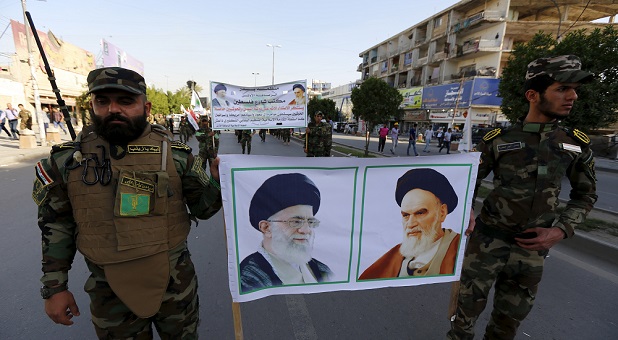Congressman: Iran Deal Makes War ‘Inevitable’
This is an edited version of a speech that Rep. Chris Smith, R-NJ, delivered on the floor of Congress on Sept. 10. To read the full speech, click here.
President Obama continues to tell Congress and the American people that the Iran nuclear agreement is the best deal possible and advances peace. Such boasting collapses under scrutiny. What was previously unacceptable—an Iranian nuclear state—is now inevitable.
Tragically, the deal poses an existential threat to Israel, our allies in the region—and even poses significant risks to the United States.
Make no mistake, Iran’s decades-long rabid hatred of Israel shows no sign of abating anytime soon. The Times of Israel reported that Iran’s Supreme Leader Ayatollah Ali Khamenei said to Israel: “You will not see [the] next 25 years,” adding that the Jewish state will be hounded until it is destroyed.
On the inspections front, Supreme Leader Khamenei has stated that he will “never” permit inspectors to inspect Iran’s military bases. Even after the agreement was signed, the Iranian Minister of Defense reportedly said that “Tehran will not allow any foreigner to discover Iran’s defensive and missile capabilities by inspecting the country’s military sites.”
Inspections under this agreement are anything but “anytime, anywhere”—the Obama Administration’s previous pledge to the nation and the world. We have learned that the International Atomic Energy Agency (IAEA) has entered into a secret side agreement to preclude unfettered, robust inspection, and in another bizarre concession by the Administration and our negotiating partners, even allows Iran to self-monitor in certain circumstances.
Under Secretary of State Wendy Sherman has said that pledges by Obama Administration officials that the agreement would guarantee “anywhere, anytime” inspections of Iran’s nuclear facilities were only “rhetorical.” Mere words without substance? Why would our allies in the region trust us if our word—and negotiating positions—are indeed only rhetorical flourish?
The key restriction on Iran’s nuclear program—the ability to enrich at high levels—begins to expire in as little as 10 years. Once these restrictions expire, Iran could enrich on an industrial scale and the U.S. and its allies will be left with no effective measures to prevent Iran from initiating an accelerated nuclear program to produce the materials needed for a nuclear weapon.
Mr. Speaker, the IAEA has uncovered significant evidence that Iran has engaged in activities related to the development of a nuclear weapon.
Furthermore, there is ample evidence that Iran has a longstanding nuclear collaboration with North Korea. In light of the abundant evidence they will present, what gives the administration certainty that the Iranians won’t at some point during this agreement acquire fissile material beyond what they are allowed to produce for themselves or actual warheads from North Korea?
Ballistic missiles are a central component of any country’s nuclear weapons program as they allow for the quick, accurate delivery of nuclear weapons over long distances. While the agreement calls for Iran to abide by all U.N. Security Council resolutions—including the requirement that “Iran shall not undertake any activity related to ballistic missiles capable of delivering nuclear weapons,” Iranian Supreme leader Ayatollah Ali Khamenei’s criticized the call for Iran to end its ballistic missile program, characterizing it as “a stupid, idiotic expectation” and claiming “The Revolutionary Guards should definitely carry out their program and not be satisfied with the present level. They should mass produce.”
Iranians have stated they are under no obligation to stop developing ballistic missiles. In fact, this agreement would allow them the two things they need to advance their program: money and foreign assistance.
Iran has repeatedly agreed to answer the IAEA’s questions regarding extensive evidence that it had a secret research and development program regarding a nuclear device, including fitting it onto a ballistic missile. All that resulted was the Iranians stonewalling the inspectors. Why would Iran provide any information now when there is nothing in the agreement to compel it to do so?
Iran currently is the world’s leading supporter of terrorism, and this agreement provides funding that will drastically expand Iran’s regional destabilization efforts—from Israel to Iraq to Yemen to Lebanon and elsewhere. The administration disputes the figure of $150 billion to be released to Iran, but even a portion of that amount would provide significant resources to fund Iran’s terrorism in the region—threatening our allies in the region and global security.
Moreover, the Administration underestimates the revenue from both rising oil prices at some point and the tax revenues from increased commercial investment and activity.
Congress should oppose in any way possible the Joint Comprehensive Plan of Action, reinstate comprehensive, robust sanctions and direct the executive branch to resume the struggle to craft an enforceable accord to ensure no nuclear weapons capability for Iran—ever.














































